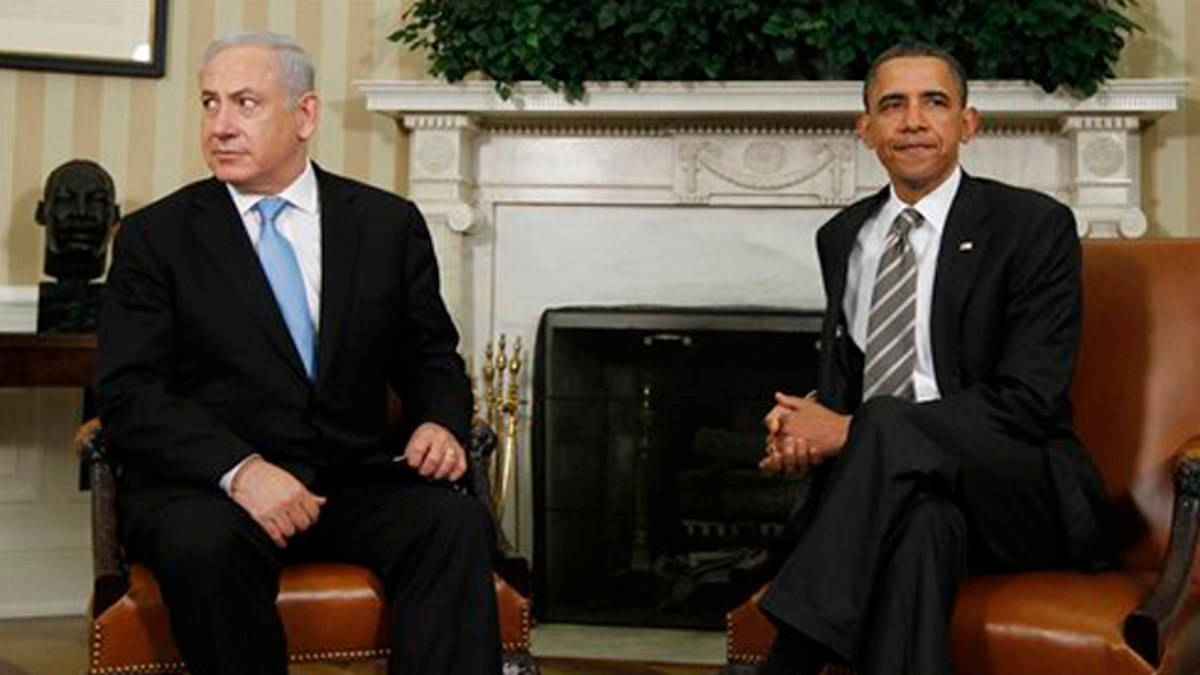
FILE: May 20, 2011: President Obama meets with Israeli Prime Minister Benjamin Netanyahu in the Oval Office in Washington . (AP)
JERUSALEM – President Obama will bring an "urgent" peacemaking agenda to Israel on his upcoming visit, focusing on the region and the resumption of talks between Israel and the Palestinians, U.S. Ambassador Dan Shapiro said Wednesday.
Shapiro spoke a day after the White House announced Obama will visit Israel, the West Bank and Jordan in the spring, at the beginning of both his second term in office and also at the start of Israeli Prime Minister Benjamin Netanyahu's third term. Obama's previous term in office saw relations with Netanyahu deteriorate in part over failed talks with the Palestinians but also due to the two leaders' different world views. The visit will be Obama's first as president to the staunch U.S. ally.
Shapiro gave several interviews to Israeli media Wednesday morning with the same message.
"We have a very urgent agenda," Shapiro told Army radio. "We have a very complex agenda about Iran, Syria and the need to get Israel and the Palestinians back to the negotiating table, so it's important to begin as fast as possible," he said.
The White House has not released the date of Obama's trip or details about Obama's itinerary, but Israel's Channel 10 reported it had been scheduled for March 20. The visit raises expectations that peace talks between Israel and the Palestinians, which collapsed about four years ago, can be rekindled.
Palestinians refuse to resume the talks unless Israel stops building in areas they claim for a future state. Israel says all issues, including territorial disputes, must be resolved through negotiations. It has frequently called for talks to be restarted.
Shapiro said that Obama will meet with the Palestinian leadership in the West Bank along with the King of Jordan, who has had a role in peacemaking efforts, during his visit.
"President Obama is not coming with conditions or demands. He is coming to confer with all our partners about problems and challenges we are dealing with in the region," Shapiro told Israel radio.
He said that Obama isn't "seeking a specific result" but wants to confer about ways of "bringing Israel and the Palestinians back to the negotiation table."
Although Obama visited Israel and Jordan while running for president in 2008, he hasn't been back since, drawing intense criticism from some pro-Israel groups who have claimed he is insufficiently supportive of the United States' closest Mideast ally. Other top administration officials, including former Secretary of State Hillary Clinton, have visited, and Clinton's replacement, John Kerry, is expected to travel to Israel on his first Mideast trip.
Shapiro shrugged off questions about relations between Obama and Netanyahu. "The personal chemistry between them is excellent. They know how to work together," he said.
Obama will also discuss Iran's nuclear program, the danger of Syrian chemical weapons reaching militants and other regional issues, Shapiro said.




